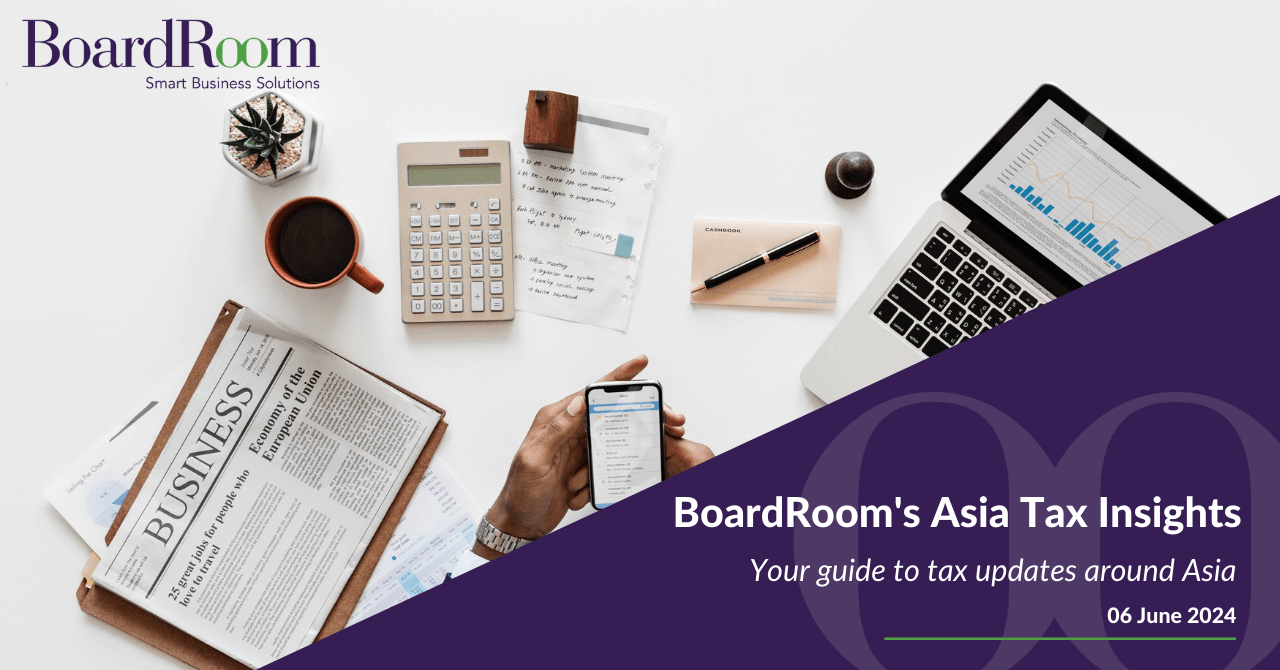| ||||||||
| ||||||||
| ||||||||
| ||||||||
| ||||||||
| ||||||||
|
Month: June 2024
Optimising Tax Compliance & Strategies in Asia: Transfer Pricing, E-Invoicing and Global Mobility
Comprehensive Guide to XBRL Filing Requirement in Singapore

Comprehensive Guide to XBRL Filing Requirement in Singapore
XBRL filing is a mandatory requirement for many companies in Singapore, playing a vital role in the realm of financial reporting. This guide dives deep into the requirements, preparation and process of XBRL filing, equipping you with the essential knowledge and steps to navigate the entire filing process, ensuring a smooth and compliant submission for your company.
What Is XBRL Filing?
XBRL stands for Extensible Business Reporting Language. It’s a standardised format requirement when incorporated companies submit their financial statements electronically to regulatory bodies such as Accounting and Corporate Regulatory Authority (ACRA) in Singapore.
Why Is XBRL Filing Mandatory in Singapore?
XBRL filing is mandatory for incorporated companies in Singapore, as mandated by the ACRA to enhance transparency, comparability, and efficiency for both regulatory bodies and companies. Traditional paper-based financial statements can be difficult to analyse and compare due to variations in format and presentation. With its standardised tagging system, XBRL ensures consistent data representation across companies.
XBRL Filing Deadlines
To ensure that your XBRL filing is successful, you must be mindful of the deadlines according to ACRA regulations.
The standard deadlines vary between listed companies and non-listed companies:
- Listed Companies: These companies must file their XBRL data within 5 months from the end of the financial year.
- Non-Listed Companies: Non-listed companies have a slightly longer grace period, with filings due within 7 months from the end of their company’s financial year.
If you require additional time to file, you can apply for an extension through the ACRA’s online platform. However, it’s recommended to submit your filing within the standard deadlines to avoid potential penalties.
Penalties for Non-Compliance
Failing to comply with XBRL filing deadlines or requirements in Singapore can result in penalties from ACRA.
These penalties may include:
Exemptions from XBRL Filing
While XBRL filing is a mandatory requirement for many companies in Singapore, certain entities are exempted from this requirement.
These exemptions include:
- Solvent Exempt Private Companies (EPCs): These companies are smaller and privately held and have the flexibility to choose to file their financial statements in traditional PDF format.
- Singapore Branches of Foreign Companies: Foreign companies operating branches in Singapore are not required to file in XBRL. They can submit their financial statements in PDF format to align with their headquarters’ reporting practices.

What Are the Types of XBRL Formats and Their Filing Requirements?
There are various XBRL filing format types, including full XBRL, simplified XBRL, and XBRL FSH for banks or insurers. However, their requirements vary.
The following is a breakdown of these common formats:
| Company Type | XBRL Format | Description | Filing Requirements (XBRL Taxonomy 2022) |
| -Listed companies
-Companies with corporate shareholders
-Companies with more than 20 individual shareholders
-Non-listed companies that are not considered smaller companies and publicly accountable | Full XBRL | Captures comprehensive company information in primary statements and selected notes. | Balance sheet, income statement, financial statement highlights, auditor’s report, director’s report (selected sections). |
| -Non-listed companies that are considered as smaller companies and publicly accountable
-Dormant companies
-Companies limited by guarantee (NPOs, Charities) | Simplified XBRL | Captures essential information on financial performance and position. | Balance sheet, income statement, statement of changes in equity (may vary). |
| Banks & Financial Institutions regulated by the Monetary Authority of Singapore (MAS) | XBRL FSH | Focuses on financial statement highlights. | Requirements vary based on the size and nature of the institution, typically including a balance sheet, Income statement, cash flow statement, notes to the financial statements, and regulatory reporting. |
| Licensed Insurers regulated by the MAS | XBRL FSH (for Insurers) | Similar to banks and financial institutions, but with specific insurance details that helps insurance companies comply with regulatory requirements. | Balance sheet, income statement, cash flow statement, schedules, supplementary information (premiums, claims, reserves, etc.). |
Preparing for XBRL Filing
Whether you need to file for simplified XBRL, full XBRL, or other format types, it’s crucial to prepare ahead to ensure a smooth and efficient process. Follow the below steps for your preparation.
- Understanding the XBRL Taxonomy: The XBRL Taxonomy serves as a standardised dictionary, defining the specific tags used to represent financial data elements in your filings. Familiarise yourself with the available tags, the tag hierarchies such as parent-child relationships, and industry-specific tags outlined in the taxonomy.
- Mapping Financial Statement Data to XBRL Tags: Achieve accurate mapping by carefully matching financial statement line items to XBRL tags.
- Learning the Tools Available for XBRL Filing: The BizFinx Preparation Tool is a free software provided by ACRA for XBRL filing. It can help you map the data, validate the XBRL file, and generate reports to prepare the XBRL financial statements.
XBRL Filing Process
Once you have prepared your XBRL files, you can start navigating the actual filing process by following the below step-by-step guide to ensure every requirement is fulfilled:
- Log in to Bizfile+
- Select your Profile
- Click ‘File eServices’
- Select ‘Local Company’
- Click ‘Annual Filing’
- Select ‘Filing of Annual Return by Local Company’ for companies with FYE before 31 Aug 2018 or ‘Filing of Annual Return by Local Company (For FYE from 31 Aug 2018)’
- Enter your company UEN and click ‘Next’
- When the E-Form is displayed, verify your company information, select the necessary fields, attach your supporting documents, review and submit.

Common Errors and Troubleshooting
Even with careful preparation, errors during the XBRL filing process are still a possibility.
The following are some of the common pitfalls you may encounter and should be careful of:
- Incorrect Tagging of Financial Data Elements: This occurs when financial data elements are matched with the wrong XBRL tags within the taxonomy.
- Missing or Incomplete Information: Incomplete data submissions and mapping to inappropriate XBRL tags can lead to filing rejections.
- Technical Glitches During Upload: Technical issues during the upload process can sometimes disrupt filing. These glitches range from internet connectivity problems to compatibility issues between your XBRL software and the ACRA’s online platform.
Apart from gaining a thorough understanding of XBRL Taxonomy, paying meticulous attention while filling in information for submission, and backing up your XBRL file, ACRA provides a troubleshooting guide for users, serving as a helpful reference for them to navigate any technical challenges.
How Can BoardRoom Help You with Fulfilling XBRL Filing Requirements In Singapore?
Understanding XBRL filing requirements ensures timely compliance for submission. Familiarising yourself with the different XBRL formats, exemptions, and potential pitfalls are important to avoid the penalties of non-compliance of your annual return filing.
As a leading provider of corporate solutions, including XBRL services, BoardRoom’s dedicated team of experts can ensure your XBRL filing requirements are fulfilled with a streamlined process to enable accurate, efficient, and timely submission.
- Expertise and efficiency: BoardRoom has dedicated XBRL specialists who can ensure accuracy, compliance, and timeliness.
- Software access: With access to advanced XBRL software, we help you streamline the process and reduce errors.
- Cost-effectiveness: While there are upfront costs, outsourcing can save time and resources in the long run, especially for complex filings.
- Local knowledge: Our expert team understands the specific requirements of ACRA and can navigate any potential challenges.
- Peace of mind: Outsourcing allows you to focus on your core business activities while ensuring your XBRL FS are compliant and filed accurately
Contact BoardRoom today to learn more about our XBRL conversion and filing services, and how we can ensure a smooth and efficient XBRL filing experience for your business.
Related Business Insights
-

17 Oct 2024
Payroll Best Practices: Your Guide To Financial Services Payroll Management
Effective payroll management in financial institutions is key to compliance and risk reduction. Find out what you c …
READ MORE -

07 Oct 2024
Your Guide to Global Mobility Tax Solutions
Discover ways to navigate tax and compliance when working with international assignments with global mobility tax s …
READ MORE -

06 Sep 2024
Case Study: Optimising Tax Efficiency in Profits Repatriation
Discover how BoardRoom's two-step tax approach helps a multinational conglomerate evaluate tax-efficient profit rep …
READ MORE
Corporate governance best practices at all levels of the company

Corporate governance best practices at all levels of the company
In business today, robust corporate governance isn’t just a box that business owners and boards must tick; it’s a strategic imperative that fuels operational excellence and gives businesses a competitive advantage. Beyond policies on compliance, good corporate governance embodies the core ethos of an organisation, shaping its culture and ensuring transparency and accountability, which are essential for sustainable growth. Organisations that have woven corporate governance best practices into their DNA can enhance their long-term success.
In this article, we delve into the purpose of corporate governance, exploring how it goes beyond policies to become the cornerstone of effective risk management, stakeholder alignment and long-term strategic planning.
We explore the role of the board of directors in ensuring good corporate governance and how the company secretary and even employees have a role to play. Discover how a holistic approach to corporate governance, as well as maintaining a strategic partnership with company secretarial experts, can drive success in Singapore’s evolving business environment.
The purpose of corporate governance
Corporate governance is a framework of rules, practices and processes that govern how a company is directed and controlled. While corporate governance encompasses compliance and policies, its significance extends far beyond these aspects, shaping the cultural and operational fabric of an organisation.
Ngiam May Ling, Associate Director of Corporate Secretarial, BoardRoom Singapore, says one of the core roles of corporate governance is to enhance transparency and accountability in processes, reporting and decision-making. “By operating transparently, companies build trust among stakeholders, including investors, customers, employees and regulators,” says May Ling. “Organisations that consistently demonstrate transparency and accountability tend to attract long-term investors interested in sustainable growth rather than short-term gains.”
A robust corporate governance framework also leads to more effective risk management. By constantly identifying, assessing and managing risks, companies can avoid potential crises and mitigate the impact of unforeseen adverse events. This approach fortifies a company’s resilience and ability to navigate challenges.
Good corporate governance also aligns the interests of stakeholders with the company’s goals. A clear delineation of roles and responsibilities helps prevent conflicts of interest. This alignment encourages collaboration among stakeholders, driving sustainable growth and value creation.
Corporate governance should also include long-term strategic planning and goal setting. This strategic focus creates enduring value for shareholders and other stakeholders, as well as better reputations and enhanced brand value.
Another tangible benefit of effective corporate governance is enhanced investor confidence. This confidence makes it easier for companies to raise funds through equity markets, debt financing or venture capital.
Strong corporate governance plays a pivotal role in shaping organisational culture, promoting transparency and accountability, managing risks effectively, aligning stakeholder interests and enhancing investor confidence. These elements collectively contribute to sustainable growth, value creation and stakeholder trust and confidence in the long term.

Corporate governance strategy
Good corporate governance starts at the board level. “Several big companies that are listed on the Singapore Stock Exchange have been consistently recognised for their strong corporate governance practices,” says May Ling. “They have large and diverse boards, some up to 10 directors. The boards of these companies are also very accomplished.”
Strong, diverse boards ensure robust corporate governance through a variety of key principles and practices, including:
The SGTI: a corporate governance benchmark for businesses
Good corporate governance can also help public-listed companies score well on the Singapore Governance and Transparency Index (SGTI), a valuable benchmark for assessing corporate governance practices in Singapore. The SGTI assessment framework includes a broad range of assessment criteria, including aspects of the board such as its competencies and independence, the directors’ remuneration and how they are selected, and board responsibilities.
Beyond shareholders, corporate governance is also important to stakeholders, so the company’s relationship with other parties is also assessed under the framework.
Transparency and disclosure are also key metrics. This includes clear and comprehensive reporting of financial performance, corporate policies, governance structures and risk management practices.

The role of the board of directors in ensuring good corporate governance
The board of directors is pivotal in setting the company’s strategic direction and ensuring that management aligns the company’s strategies with its objectives and values. This involves evaluating business plans, approving major investments, and monitoring performance against strategic goals.
The board also oversees the company’s risk management framework, ensuring that risks are identified, assessed, and appropriately managed. This includes monitoring financial, operational, legal, and reputational risks, as well as ensuring compliance with regulatory requirements and ethical standards.
Financial oversight is one such critical aspect. The financial reporting process should be supervised to uphold accuracy, transparency and compliance with accounting standards and regulations. This is often facilitated through board committees such as the audit committee.
The board is also responsible for appointing and overseeing management, ensuring they possess the necessary skills, experience and integrity to lead the company effectively.
Succession planning is another board responsibility in corporate governance. This requires the board to collaborate with the nominating committee to ensure a continuous pipeline of talented leaders for future key roles.
The board also ensures the company’s adherence to legal, regulatory and ethical standards by establishing codes of conduct and ethical guidelines for employees. The guidelines often include provisions for whistleblowing protection to safeguard the identities of whistleblowers.
These actions collectively reflect good board practices in corporate governance and underscore the importance of the board of directors in corporate governance initiatives.
In Singapore, boards of directors are expected to uphold high standards of corporate governance to protect shareholder interests, promote transparency and accountability, and contribute to the long-term success and sustainability of companies.
The role of compliance in corporate governance
Compliance plays a pivotal role in corporate governance within a company, acting as a foundational element that ensures the organisation operates within legal and ethical boundaries. This includes overseeing the development of risk management frameworks that identify, assess and manage risks effectively with a focus on compliance-related risks like know your customer (KYC), anti-money laundering (AML) and conflicts of interest (COI).
The key governance practices essential for compliance in order to maintain effective corporate governance within an organisation include:
- Establishing guidelines for regularly reviewing and updating customer verification processes to prevent identity fraud, ensure financial integrity, and uphold the company’s reputation.
- Defining AML policies and ensuring robust systems are in place for the monitoring of financial transactions to detect and prevent illegal activities like money laundering.
- Setting policies for identifying, disclosing and managing conflicts of interest to ensure all decisions are made in the company’s best interest and uphold the highest ethical standards.
The role of the company secretary in corporate governance
The role of a company secretary is instrumental in establishing and maintaining good corporate governance practices.
Company secretaries undertake the following responsibilities to foster corporate governance:
The role of the employees in corporate governance
Employees also play a role in ensuring good corporate governance including KYC, AML and COI policies.
May Ling says employees are expected to adhere to high ethical standards. “This will contribute to a culture of integrity and trust within the organisation, which is fundamental to good corporate governance.”
At a minimum, employees can be expected to comply with policies and procedures. They should be encouraged to contribute to good corporate governance by conducting themselves ethically, supporting compliance efforts with audits and participating in compliance initiatives and programs.
Employees will need training to understand their roles and responsibilities in upholding regulatory compliance and ethical standards, including recognising potential risks and knowing how to address them. They should be encouraged to report any suspicious activities or potential conflicts of interest to the appropriate channels in the organisation, which contributes to a culture of transparency and accountability.

Partner with a team of experts you can trust
Corporate governance is an important strategic component of success for all businesses. Good corporate governance enhances an organisation’s transparency and accountability, ensuring compliance. However, corporate governance best practices also foster a positive and high-performing organisational culture that can drive sustainable business growth.
It’s critical for all businesses to have a strong corporate governance strategy and for boards and management to play a key role in ensuring these measures are followed.
With a full suite of corporate secretarial services in Singapore and across the Asia-Pacific region, BoardRoom can help your business in all aspects of corporate governance.
BoardRoom also provides comprehensive support for your business’ statutory and regulatory compliance needs, including:
- Advising on statutory and regulatory compliance obligations, ensuring accurate reporting of company or corporate structure changes to relevant authorities, and assisting with stock exchange compliance and company announcements.
- Maintaining statutory registers, minute books and company records, and attending board and shareholder meetings while preparing minutes and resolutions.
- Drafting and reviewing corporate governance reports, performing gap analysis of corporate governance frameworks, and enhancing governance rankings.
- Drafting and revising the board charter and terms of reference for board committees, along with policies related to insider trading, board diversity, transactions of interest, whistleblowing, investor relations, sustainability and business ethics.
- Conducting annual performance evaluations of the board, board committees, and individual directors, including assessing the independence of proposed independent directors.
To discover more about corporate governance and how BoardRoom can help, get in touch with the team today.
Contact BoardRoom for more information:
Related Business Insights
-

17 Oct 2024
Payroll Best Practices: Your Guide To Financial Services Payroll Management
Effective payroll management in financial institutions is key to compliance and risk reduction. Find out what you c …
READ MORE -

07 Oct 2024
Your Guide to Global Mobility Tax Solutions
Discover ways to navigate tax and compliance when working with international assignments with global mobility tax s …
READ MORE -

06 Sep 2024
Case Study: Optimising Tax Efficiency in Profits Repatriation
Discover how BoardRoom's two-step tax approach helps a multinational conglomerate evaluate tax-efficient profit rep …
READ MORE
Accounting services in the midst of the accountant shortage

Accounting services in the midst of the accountant shortage
In recent years, Singapore has faced a growing discrepancy between the demand for professional accounting services and the supply of qualified accounting graduates, which has proved challenging for businesses reliant on precise and timely financial oversight.
Yang Shuzhen, Director of Regional Accounting Services at BoardRoom Group, says the shortage of accountants in Singapore means businesses face potential operational issues, including the disruption of daily accounting functions and increased risks of non-compliance with tax and reporting requirements. These disruptions can also lead to reputational risks and strained relationships with vendors and clients due to the inability to meet financial obligations or report accurately.
Here, we explore strategic solutions, including outsourcing and professional development, to ensure businesses continue to have uninterrupted access to high-quality, reliable accounting services.
Mitigating risks with outsourced financial accounting services
The gap between supply and demand for qualified accountants is impacting organisations across the board, with a 10% decline in students pursuing accounting degrees during the past five years. In fact, it’s projected that an extra 7000 professionals will be required by 2025.
As companies grapple with this shortage, they may face operational disruptions across multiple areas of their business, such as:

Why outsourcing accounting could be beneficial to your business
Finding ways to mitigate the implications of the ongoing shortage of accountants is vital. That’s why outsourcing accounting services has become a key strategy for many businesses.
There are many advantages of outsourcing accounting services, beginning with repetitive, rule-based accounting tasks like accounts payable (AP) and accounts receivable (AR). This approach alleviates immediate staffing issues while also streamlining operations, allowing companies to focus on more strategic activities.
By outsourcing these routine functions, businesses can take advantage of specialised accounting services, including access to broader teams and skilled accountants who are well-versed in handling large volumes of transactions efficiently and accurately. This shift ensures continuity and reliability in financial reporting and enhances overall financial management.
Customising accounting functions
Shuzhen highlights flexibility as one of the key advantages of outsourcing accounting services. “In accounting, there’s a real ability to either fully outsource everything or just select specific tasks that are inefficient for the client to handle in-house,” she says.
Many businesses have traditionally viewed their financial operations as a single, indivisible block, adhering to an all-or-nothing approach. However, realising that these tasks can be managed independently reveals new opportunities for enhanced efficiency and specialised management.
“Clients often struggle to imagine the impact of removing a segment from their finance department, fearing that removing just one part could cause the entire system to collapse,” Shuzhen explains. “When outsourcing, there are typically specific challenges the client needs addressed, and our approach at BoardRoom isn’t to overhaul everything at once but to suggest incremental changes that enhance the overall function without disrupting the core processes.”
Process and efficiency improvement
Another reason why outsourcing accounting services is compelling for companies is the insight into best practices and innovations that dedicated professionals can bring. By applying recommended improvements, organisations can benefit from enhanced productivity, reduced operational costs, and a more strategic approach to financial management, ultimately leading to better financial outcomes.
Ensuring compliance
Outsourcing accounting functions, especially when facing internal resource limitations, also ensures that businesses remain compliant with regulatory requirements. Outsourcing firms specialise in compliance and are adept at keeping up-to-date with the latest changes in accounting standards and regulations. This is crucial for businesses operating in multiple jurisdictions or in complex regulatory environments. By leveraging the expertise of these providers, companies can avoid the pitfalls of non-compliance, such as fines, penalties and reputational damage.

Responding to the shortage of accountants in Singapore
In tackling the challenges posed by the shortage of accountants, leveraging technology, professional development and education for staff is essential.
Enhancing efficiency with technology
Using advanced technology can streamline tedious, manual processes, thereby reducing the workload on existing staff and allowing them to focus on more strategic, high-value activities. Technologies such as AI and automated data processing can enhance efficiency and accuracy in accounting tasks.
At BoardRoom, we are actively addressing the traditional perceptions of accounting as a labour-intensive field by integrating advanced technologies such as Optical Character Recognition (OCR) and AI into our operations. In doing so, the BoardRoom team also ensures that the adoption of these technologies does not compromise stringent internal controls. Our expert staff review the outputs from automated processes to maintain high standards of financial reporting.
Investing in talent
Ongoing professional development ensures staff remain current with the latest accounting standards and practices while growing their skills in new technologies and methodologies. This kind of training boosts morale by showing investment in employees’ career growth and enhances adaptability to changing business environments.
Shuzhen underscores the importance of such initiatives, saying: “Investing in our staff’s growth not only prepares us for the future but also helps in retaining talent by involving them more deeply in the business and organisational culture.”
BoardRoom demonstrates its commitment to enhancing the skills and knowledge of its workforce through several partnerships and recognitions:
- Recognised employer partner of CPA Australia: BoardRoom is committed to the professional growth of its employees, providing them with continuous learning and development opportunities.
- ACCA Approved Employer: BoardRoom has achieved this prestigious status in two categories – Professional Development and Trainee Development, Gold. This highlights the management team’s dedication to nurturing their workforce.
- Memorandum of Understanding with the Association of International Certified Professional Accountants (AICPA) and Chartered Institute of Management Accountants (CIMA): This partnership allows BoardRoom accounting staff to access industry best practices, engage with subject matter experts, explore thought leadership content and pursue top-tier professional qualifications.
- Chartered Accountant Accredited Training Organisation (ATO): As an ATO, BoardRoom offers early employment opportunities to Chartered Accountant (CA) candidates. By hiring, training, and developing Singapore CA Qualification candidates, BoardRoom provides them with the necessary resources and support to fulfill the three-year practical experience required to qualify as a Chartered Accountant of Singapore.

The way forward
As businesses navigate the evolving landscape of financial management amidst shortages and technological shifts, partnering with a company like BoardRoom can provide the expertise and innovation needed to safeguard financial operations. BoardRoom’s strategic approach to leveraging technology, combined with a commitment to continuous professional development, ensures that clients receive high-quality accounting services tailored to meet today’s challenges.
BoardRoom offers a comprehensive suite of accounting services, including regulatory compliance, financial reporting and risk management. By entrusting these critical functions to BoardRoom, companies can enhance their operational efficiency, maintain compliance with ever-changing regulations, and harness the power of cutting-edge technology in financial management. Explore how BoardRoom’s accounting services can help your company adapt and thrive in this evolving environment.
Contact BoardRoom for more information:
Related Business Insights
-

17 Oct 2024
Payroll Best Practices: Your Guide To Financial Services Payroll Management
Effective payroll management in financial institutions is key to compliance and risk reduction. Find out what you c …
READ MORE -

07 Oct 2024
Your Guide to Global Mobility Tax Solutions
Discover ways to navigate tax and compliance when working with international assignments with global mobility tax s …
READ MORE -

06 Sep 2024
Case Study: Optimising Tax Efficiency in Profits Repatriation
Discover how BoardRoom's two-step tax approach helps a multinational conglomerate evaluate tax-efficient profit rep …
READ MORE
Unlock the Power of Evidence-Based ESG Data with ESG Access

Unlock the Power of Evidence-Based ESG Data with ESG Access
| ||||||||||||||||||||||||||||||||||||||
| ||||||||||||||||||||||||||||||||||||||
| ||||||||||||||||||||||||||||||||||||||
| ||||||||||||||||||||||||||||||||||||||
|












